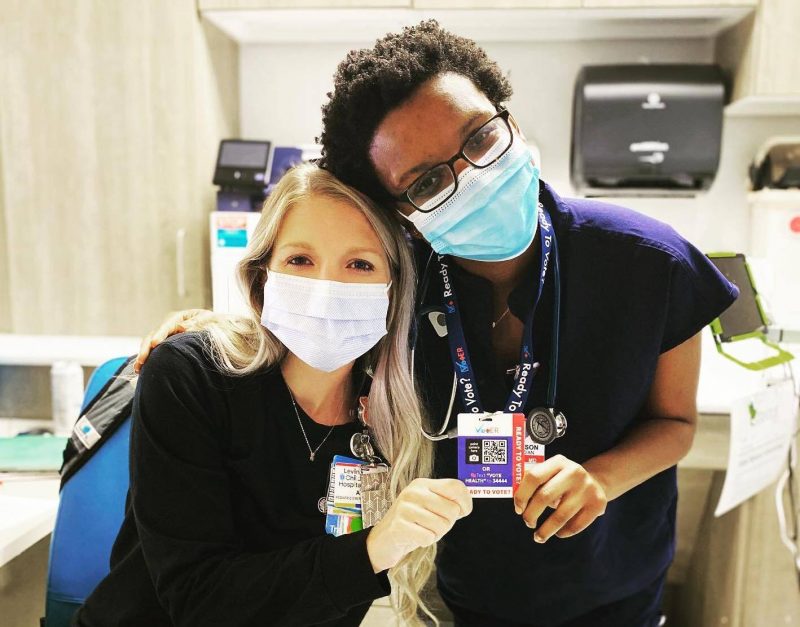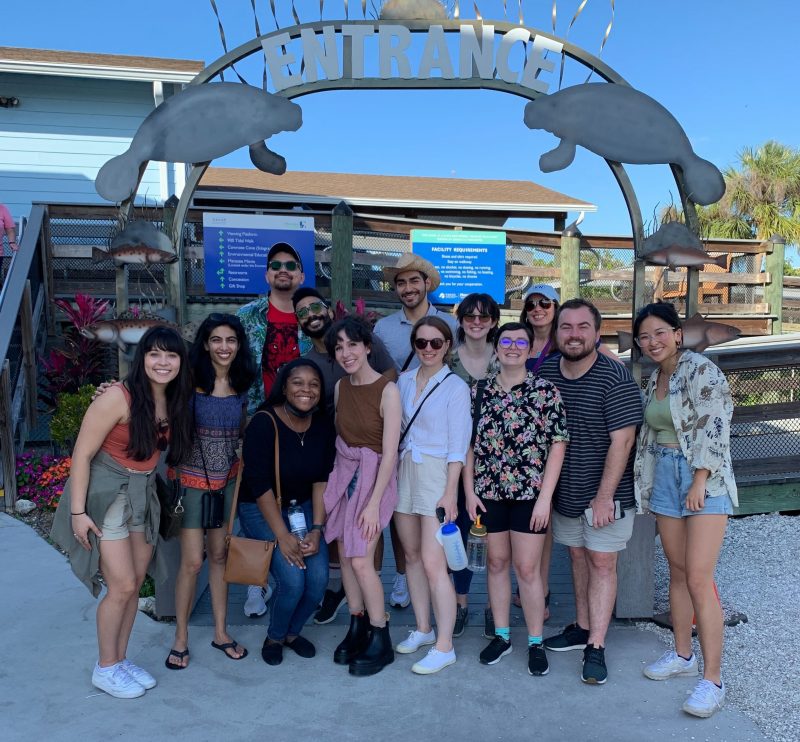Social Entrepreneur Spotlight: Aliya Bhatia of Vot-ER
March 22, 2023Vot-ER, one of eight organizations in New Profit’s Civic Lab 3 Cohort of Democracy Entrepreneurs, develops nonpartisan civic engagement tools and programs for every corner of the healthcare system—from private practitioners to medical schools to hospitals.
Vot-ER’s work is driven by a community of healthcare professionals, organizers, clinical students, and technologists united by a common vision: healthy communities powered by inclusive democracy.
To help us get closer Vot-ER’s work, Executive Director Aliya Bhatia discussed how healthcare and civic engagement have more in common than one might expect, the value of cross-disciplinary work, and how she strives to bring the “splendor of our differences” to her leadership. We’re pleased to share Aliya’s insights below.
Q: Can you share a story that brings to life why you made the decision to pursue a career in your field?
A: I came to Vot-ER after shadowing a paramedic for a day in Atlanta, Georgia in 2019. From the beginning of my visit, we knew we had grown up in different communities, came from different generations, and had different politics. After watching his team respond to many social challenges—homelessness, changes in health insurance, food insecurity, and more—I became overwhelmed by what these EMTs were being asked to do without proper resources. So I asked the paramedic, my guide, what would he do if he could only change one thing? If he had a magic wand that he could only wave once before it disappeared?
Given the various projects I had helped lead across many corners of social policy, I was guessing which social challenge he would choose to vanquish first.
But then, his answer surprised me. He said “Aliya, if I could only change one thing, I wish all my patients would vote.”
He explained that if all of his patients voted, local leaders would put resources into affordable housing, jobs training, and making sure there was a grocery store in every neighborhood. And that if all his patients voted, his department would have enough resources to get an ambulance to every emergency in time.
Until that point, my work background had primarily been in education and housing. On the side, I had begun to dip my toe into community organizing in DeKalb County, where I had been raised. An election was less than a year away, and I knew I needed to be part of it. The paramedic’s thoughts sat with me, hinting at a bridge between my work passions and personal hobbies that —if built—could be transformative. But I couldn’t quite see how to bring it all together.
Then, in January 2020, I heard about an organization called Vot-ER that was helping patients in hospital waiting rooms to register to vote. That bridge was suddenly and serendipitously becoming quite clear. Through joining the organization, I began a new and novel chapter of my career.
Q: What is the one thing you wish more people knew about the challenges Vot-ER is working to address?
A: Every health professional who has seen a patient struggle to pay the cost of their medications or who has seen a child with asthma knows that there are forces beyond the clinic walls that profoundly shape the health of our communities. Clean water, air pollution, drug pricing, and more are all factors that affect our health that health professionals can do little to address in their daily work.
At Vot-ER, we provide voter registration tools to every corner of the healthcare system. A question we often get is why we are trying to add something to health professionals’ already-full plates. The curious thing is, the health professionals involved in our work often feel lighter, more impactful, and more alive in their work because of the emphasis on democracy that we bring into the health space.
As a result of their visceral understanding of the link between voting and health, over 30,000 health professionals at 700 hospital and clinical sites have brought Vot-ER to their health organizations. Together, the Vot-ER community has reached hundreds of thousands of patients with voting reminders and directly helped over 75,000 Americans in their journey to vote.
Health professionals know that we won’t be able to fix this system until their patients have real political voice and power. Vot-ER gives them a way to prescribe a different type of medication – the agency and input of those closest to our health challenges – as part of a solution to health equity.

Q: What has been the most fulfilling part of the work that you do?
A: I live for cross-disciplinary work, and Vot-ER gives me that opportunity every day. Our team has been a rigorously multidisciplinary crew from the start. We think intentionally about how doctors, nurses, social workers, and others can all be part of the movement to advance and sustain democracy – a marked departure from the existing structures that can fracture, divide, and silo the many distinct professional tracks within healthcare. We work across all 50 states, rural and urban communities, and in settings ranging from mobile clinics to major academic hospitals.
I get my energy from crossing traditional boundaries, from listening in moments of extreme polarization, and from finding the beauty in our differences. Our incredible team and community at Vot-ER give me the opportunity to do that every single day.
Q: How would you describe your leadership style?
A: Sitting in the startup office of the National Center for Civil and Human Rights, I was hatching a new idea with my BCG mentor Rod Garcia Escudero and with the Center’s founding Executive Director Doug Shipman. We were working on a DEI training for the BCG Atlanta office at a time when there were few precedents to draw on for our business consulting context.
What could we call this thing? What gave it the authenticity of a tailor-made diversity effort for a consulting firm that prided itself on designing for the specific needs of their clients? What would land with our audience?
We decided to call it “Harnessing All The Brilliance.” For me, that tagline became more than a workshop. It became my leadership mantra.
In a journal by the same name, I collect practices and examples of leading through the splendor of our difference. Whether it is a particular facilitation approach to help get the widest range of input, or a cartoon about how conflict done right can result in creation, or an example of a Belgian mayor who led his city through generational change – I relish discovering the practices that help us bring the full mosaic of who we are to our work, life, and play.
At Vot-ER, building on our founder’s efforts, I encourage the team to regularly seek external perspectives about our work. I emphasize cross-disciplinary learning spaces like learning pods and book clubs. And similar to what Rod did for me, I strive to give as much power as I can to our most junior team members, knowing that what they can build from their vantage point is informed by their proximity to those we serve.
I believe that our most beautiful moments, the moments of transcendence, come from the infinite beauty of our unique backgrounds, that only by harnessing all the brilliance can we find the gifts of heaven here on this earth.

Q: Is there anything else you’d like to share that might help people to feel closer to you or your work?
A: Choosing to step into leadership can feel like a tightrope. There is always a risk of failure. These days, I often find that leadership can feel even harder than walking a tightrope – it can feel like attempting to cross a ravine on a brittle wire.
Our health professionals feel it—they navigate pandemic deniers, prolonged staffing shortages, and the daily exhaustion of having to solve policy failures with the limited tools of an exam room.
And I feel it. I feel it in my heightened anxiety with rapid reactions to every current event while trying to develop long-term sustainable change. I feel it in the moments when even a flat organization like Vot-ER has to make a decision that not everyone loves. I feel it in the confluence of pressures that crest together just before a major election.
The work of strengthening our democracy will require both compassion for the moments that leaders make mistakes, and also giving more people the power that comes with leadership. In the end, when we’ve woven a net together from the ropes of many sizes from so many different and unique people—so many different and unique LEADERS—that is when we will know that we are on the path to winning.
To get closer to Vot-ER, sign up for their newsletter on their website or hear from one of their health professionals on PBS NewsHour. Learn more about why Democracy is a key investment area for New Profit in our State of Democracy Entrepreneurship report.